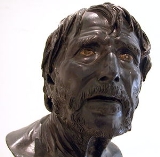
oral poet generally thought by scholars to have been active between 750 and 650 BC, around the same time as Homer. His is the first European poetry in which the poet regards himself as a topic, an individual with a distinctive role to play. Ancient authors credited him and Homer with establishing Greek religious customs. Modern scholars refer to him as a major source on Greek mythology
, farming techniques, early economic thought
(he is sometimes identified as the first economist), archaic Greek astronomy
and ancient time
-keeping.
The dating of his life is a contested issue in scholarly circles and it is covered below in Hesiod#Dating.
Epic narrative allowed poets like Homer no opportunity for personal revelations but Hesiod's extant work comprises didactic poems and here he went out of his way to let his audience in on a few details of his life, including three explicit references in Works and Days, as well as some passages in his Theogony that support inferences.
Love, who is most beautiful among the immortal gods, the melter of limbs, overwhelms in their hearts the intelligence and wise counsel of all gods and all men.![]()
There was not after all a single kind of strife, but on earth there are two kinds: one of them a man might praise when he recognized her, but the other is blameworthy. ![]()
Potter bears a grudge against potter, and craftsman against craftsman, and beggar is envious of beggar, and bard of bard.![]()
Fools, they do not even know how much more is the half than the whole.![]()
Often an entire city has suffered because of an evil man.![]()
He harms himself who does harm to another, and the evil plan is most harmful to the planner.![]()
Badness you can get easily, in quantity: the road is smooth, and it lies close by. But in front of excellence the immortal gods have put sweat, and long and steep is the way to it, and rough at first. But when you come to the top, then it is easy, even though it is hard.![]()
A bad neighbor is a misfortune, as much as a good one is a great blessing.![]()
Do not seek evil gains; evil gains are the equivalent of disaster.![]()
If you should put even a little on a little, and should do this often, soon this too would become big.![]()

